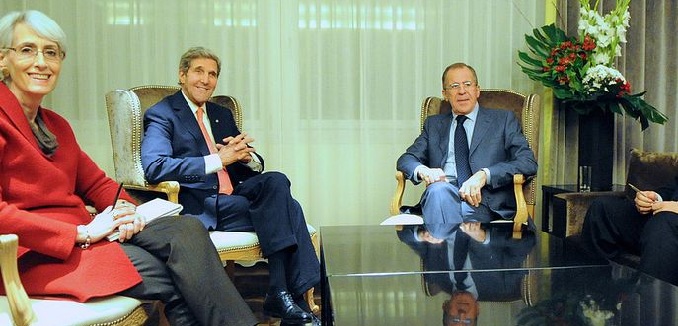Former Israeli national security adviser Yaakov Amidror spoke over the weekend to the Financial Times, days before global powers were set to meet with Iranian negotiators in efforts to strike a deal over Iran’s nuclear program. The P5+1 group has been criticized – including by France, which is part of the group – for trying two weeks ago to strike a “sucker’s deal” with Tehran in order to secure some kind of agreement. Congressional lawmakers had for their part long ago begun criticizing any deal that would permit Iran to continue enrichment activities or keep parts of its enriched stockpile intact as unacceptable.
The Geneva deal would have allowed Iran to do both. Tehran would have been called upon to make limited concessions – the Islamic republic would still have been able to make progress toward both uranium-based and plutonium-based bombs – in exchange for what analysts estimated to be around $20 billion in sanctions relief.
There are fears that a similar deal will be offered in talks that are scheduled to start tomorrow night in Geneva, and that this time it will succeed. Amidror emphasized that if the international community seems set to allow Iran to go nuclear, Israel will act alone:
“We are not the United States of America, of course, and believe it or not they have more capabilities than us,” Amidror said. “But we have enough to stop the Iranians for a very long time… We are not bluffing,” he said. “We are very serious – preparing ourselves for the possibility that Israel will have to defend itself by itself.” Amidror said Israel could not, nor would it want to, “count on others to do the job if the others don’t want to do the job.”
Analysts banged on the table for months emphasizing that a deal that left enrichment intact would, given Iran’s current enrichment technology, allow the Islamic republic to dash across the nuclear finish line at will. Washington Institute managing director Michael Singh had even outlined how the resulting uncertainty risked a full-blown regional nuclear arms race.
There are precise figures on the minimum that Iran would be forced to concede for any interim agreement to genuinely ‘put time back on the clock’ – which is to say, to genuinely lengthen the amount of time it would take Iran to construct a nuclear weapon. The U.S.-based Institute for Science and International Security (ISIS) weeks ago published an assessment [PDF] describing the minimum requirements. The ISIS report described five prerequisites:
(1) halting all centrifuge installation and production, and disabling all but 9,000 existing centrifuges
(2) halting all production of 20% uranium and putting beyond use all 20% enriched uranium
(3) disabling all centrifuges at the country’s underground military enrichment bunker at Fordow
(4) halting progress at its Arak complex, which includes a plutonium reactor and a heavy-water production facility
(5) accepting new inspection and monitoring requirements, up to and including cameras at all centrifuge plant locations or daily inspections.
Iran has reportedly refused to meet multiple conditions, and has insisted on that it be allowed to continue producing centrifuges and making progress at Arak. Allowing Iran to conduct either would, almost by definition, permit Iran to make progress toward acquiring uranium and plutonium-based nuclear weapons.
[Photo: U.S. State Department / Flickr]




